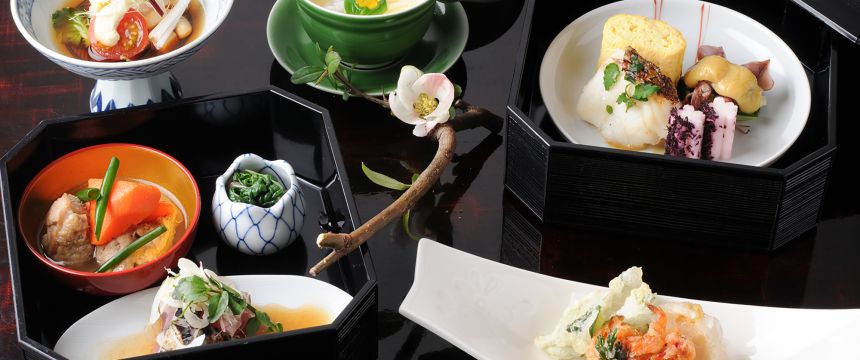Central Tokyo, Tokyo Metropolitan Area - Kanto
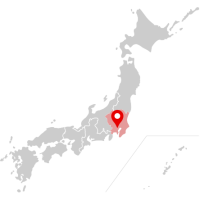
In recent years, the Japanese culinary world has seen a trend toward the inclusion of the word jibie (from the French word gibier meaning “wild animal hunted for food” or “game”) on restaurant menus. Although many people think of jibie as the traditional food of European nobility, it has been used in Japanese cuisine since ancient times, with time-honored game-meat dishes—such as momiji stew, having venison as its key ingredient, and botan stew, featuring boar meat—being a mainstay in rural life.
The popularity of jibie in Japan declined after the Meiji period (1868–1912) when farm-raised beef and pork became prevalent throughout the country. After a long hiatus, game meat is now returning to dinner tables in Japan. Many Japanese people, including athletes and celebrities, are now voicing support for jibie cuisine as a low-calorie, low-fat, and high protein, not to mention delicious, food.
Forest to Table—Game Meat in Tokyo

In Tokyo, the number of restaurants serving jibie dishes is on the rise, from traditional Japanese nabe (hot-pot) and shabu-shabu restaurants to European bistros and fine-dining establishments. Jjibie cuisine is quickly becoming sought after once again in Japan. The challenge, however, is to make jibie cuisine that appeals to Japanese diners, which means the meat must be carefully sourced and cooked to create tasty, hearty dishes without a strong gamy flavor. This preference for high-quality meat is, more than anything else, what sets contemporary game cuisine apart from its rustic forebears.
One establishment that has taken up the challenge is Elezo Gate, a meat restaurant nestled in Toranomon Yokocho, a dining district in Toranomon Hills, that regularly serves jibie cuisine.
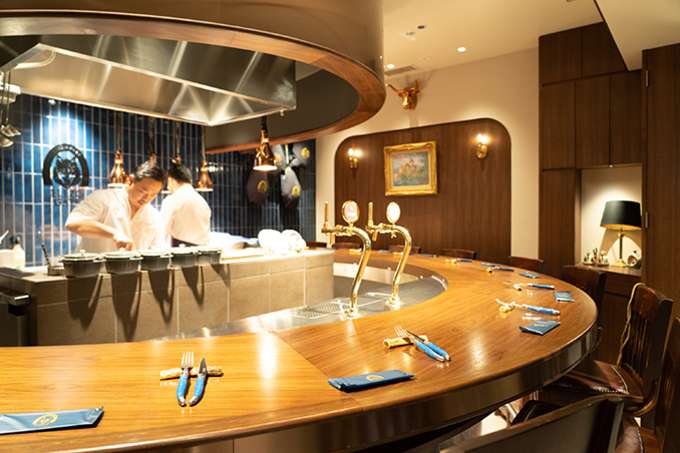
Elezo Gate emphasizes its high-quality meat and its use of all parts of an animal without wastage. The restaurant’s goal is to always create dishes that bring out the natural flavors of the meat. At Elezo Gate, all seasonings, including sauces and spices, and even the wines offered with the meal, are specially curated to complement the ingredients in meat dishes without overpowering the genuine flavor of the meat itself.
The Elezo Group was established in 2005 as a meat processing and distribution business in Obihiro, Hokkaido. It has since expanded to include a variety of brands and now operates as an integrated meat production and management system. Although Elezo Gate does not specialize solely in jibie cuisine, it has become well known in Tokyo as a gateway to the world of game.
A Journey into Japanese Jibie Cuisine

To be able to focus on the true flavor of the meat itself, choose a charcuterie plate featuring a selection of Elezo’s own processed deer meat, pork hams, terrines, salami, and other cold cuts. The meats are complemented by carefully chosen seasonal mountain vegetables.

Start the meal with a delightful charcuterie plate comprising venison and pork, all prepared at Elezo’s own meat-processing plant. Every part of the animal is used—even the antlers, which are turned into chic cutlery holders!
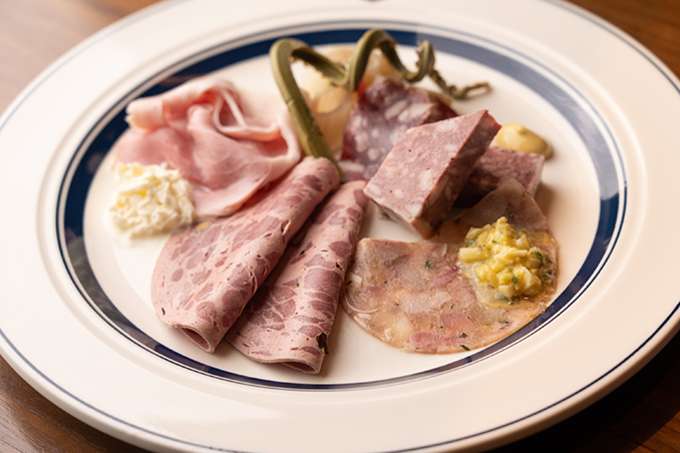
A juicy venison steak served with a sauce made from deer-bone broth stars as the main dish. Although wild-deer thigh meat is lean and high in protein, it can often have a tough texture and a strong taste. Despite the minimal use of spices and herbs, however, Japanese wild-deer steak does not taste gamy at all and is very tender with a rich flavour.
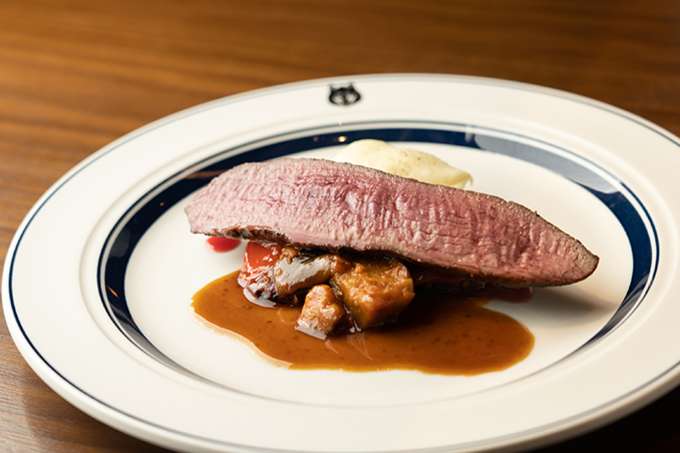
Wild-deer steak pairs perfectly with a glass of red wine. The dark-red meat is lean and firm with a distinct, delectable flavor. Elezo Gate uses only deer meat from animals that are about two years old so that the steak is more succulent. It takes about three weeks for Elezo’s meat-processing plant to prepare the meat before it is shipped to the restaurant.
Gifts from the Woodlands

Elezo Group’s CEO, Sasaki Shota, says that he became interested in jibie cuisine because it is one of the most challenging. With more than fifteen years of experience as a meat specialist, he established Elezo Gate with the mission of becoming a meat restaurant that procures and processes its own meats, including jibie.

The biggest challenge in preparing and serving jibie meats is managing sanitation properly. Poorly sourced wild game can carry viruses and other parasites, which are generally well controlled in farm-raised animals, such as pigs and cows. In 2014, Japan’s Ministry of Health, Labour and Welfare set strict guidelines for hygiene in handling wild game to maintain food safety. Each step in the process must be carefully monitored, from hunting and transport of the animal to butchering, processing, preparing, and selling its meat—in other words, everything from capture to consumption.
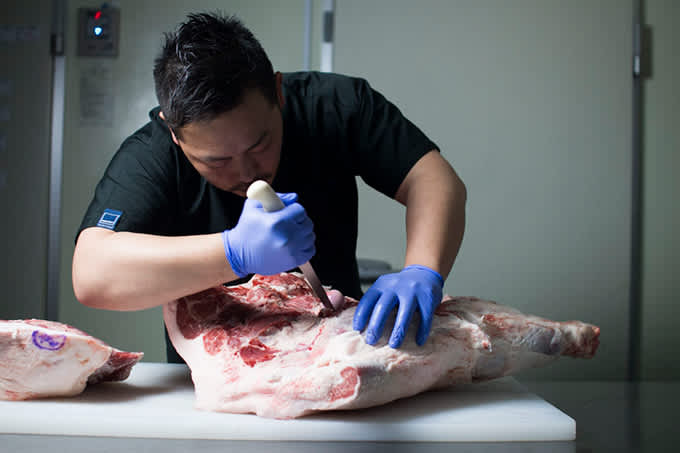
It is, however, difficult for restaurants that purchase game meat from various slaughterhouses to ensure high standards of hygiene and the authenticity of the jibie meat. The Elezo Group prides itself on its A-to-Z operations, where game meat is acquired directly from the hunter and the entire preparation process is completed at designated Elezo meat-processing plants. Elezo requires that all the hunters it works with deliver the game to the meat-processing plant within two hours of taking the animal.
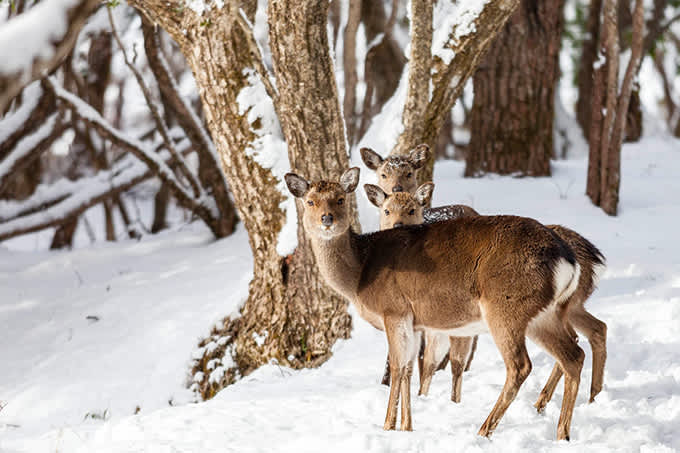
In Japan, most game is hunted in the prefectures of Hokkaido and Mie. Unlike game meats used in the cuisine of other countries, jibie used in Japanese cuisine is renowned for its delicate, clean flavour. The game meat derives its wild taste from what the animal eats. According to Sasaki, proper processing of the meat is crucial to lessening the wild taste and increasing the tenderness of the jibie.

On the subject of sustainability, Sasaki comments that the rise of a jibie food culture in Japan would benefit rural prefectures, since deer and other wild animals cause significant damage to many agricultural regions. With jibie cuisine, game could be viewed as a gift from nature, since it would be hunted to give consumers a nutritious culinary experience, instead of being culled as a pest.
In the Pursuit of Purity
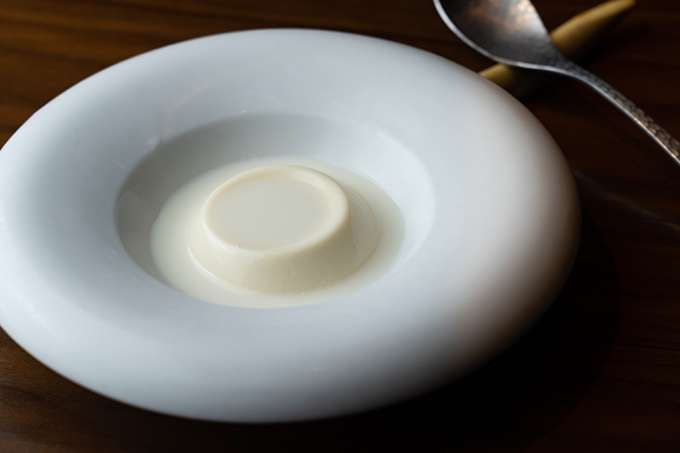
The final dish at Elezo Gate was a Hokkaido-milk pudding with lemongrass. The white dessert merging with the stark bowl symbolizes the philosophy of Elezo Gate to achieve simplicity and purity in its dishes.

Other jibie meats that can be found at Elezo Gate include brown bear (higuma), rock ptarmigan (raicho), and rabbit from Hokkaido.
If you are looking for a new experience in meat cuisine as well as a healthy alternative to beef and pork, why not give Japan’s jibie cuisine a try? The animals are sourced from the Japanese hinterland, where their meat has long been part of the diet of local hunters. Available game meats change with the seasons, and there are various ways to prepare and enjoy them year-round.
Today, through innovative cooking and refined preparation techniques, Japan’s jibie cuisine can send you on a tasty journey in wild yet sustainable dining.
Contact Information
Elezo Gate - Toranomon Yokocho
〒105-0001 Tokyo, Minato City, Toranomon, 1 Chome−17−1 Business Tower 3F
How to Get There
Toranomon Yokocho is directly connected to several subway stations in Tokyo: Toranomon Hills Station on the Tokyo Metro Hibiya Line, Toranomon Station on the Tokyo Metro Ginza Line, and Kasumigaseki Station on the Tokyo Metro Chiyoda Line, Marunouchi Line, and Hibiya Line. It is accessible also from Uchisaiwaicho Station on the Toei Mita Line and can be reached in about eleven minutes on foot from JR Shimbashi Station. The central location means that you can add a taste of the wild to any day in Tokyo.
Recommended Itineraries
Japanese jibie (wild-game) cuisine is widely available in Tokyo and other major cities in Japan. For the real deal, however, you will want to seek out smaller, local restaurants near the main hunting grounds and forested mountain regions of Japan, such as those in Hokkaido, Mie, and Nagano prefectures. There, restaurants get their game meat directly from the local huntsman. The industry is well regulated to ensure responsible hunting methods and avoid overhunting.
Related Links
Tokyo (English)
Map
Featured Cuisine
Japanese wild-game cuisine, also known as jibie cuisine, uses the meat of hunted deer, boar, fowl, and other animals as ingredients. While jibie cuisine has a long history in Japan, contemporary Japanese jibie food culture has also been influenced by the traditional cuisine of European nobility, leading to a diversity of dining styles. The meat of the wild animals that inhabit the dense mountain forests of Japan is remarkably low in fat and highly nutritious. Most game cuisine is carefully prepared and cooked to create a rich, delicious dish that does not taste overtly gamy.
-
Author
Author: Rachel
Rachel is an East Asia and cross-culture communications specialist graduated from Duke University and Harvard University in the U.S., and a former Miss Singapore 2013 titleholder. Having lived and worked in many countries including South Korea, Italy, Singapore, China, and the U.S., Rachel moved to Japan 4 years ago. She enjoys traveling to learn about the diverse foods, culture, and rich history of Japan, and writes an English-Japanese bilingual blog to share her experiences with readers worldwide.
All information is correct as of the time of writing.
Please check for the latest information before you travel.





















































